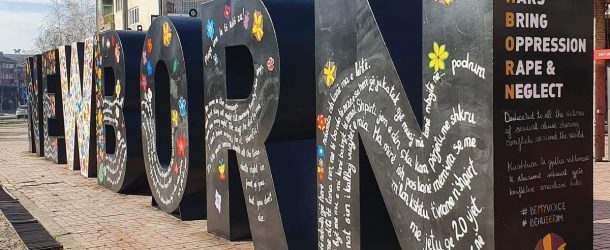June 19 is marked each year as the International Day for the Elimination of Sexual Violence in Conflict, in order to raise awareness of the need to put an end the sexual violence in wars, to honor the victims and survivors of sexual violence around the world, and to pay tribute to all those who have courageously devoted their lives to and lost their lives in standing up for the eradication of these crimes.
The issue of wartime sexual violence became headline news in Balkans where wartime sexual violence as a weapon of ethnic cleansing was latest used in modern combat. It is estimated that 25,000 – 40,000 women were victims of mass rape during Bosnia and Herzegovina conflict of 1992-1995 and about 20,000 were victims of sexual violence during the Kosovo conflict of 1998-1999. It was observed that Serbian soldiers acted with the same thought and tactics in the War of Kosovo after the war in Bosnia and Herzegovina. The other fact that doesn’t change is when a woman is raped, the entire family is affected for generations to come. They were also tortured, cut, and beaten, cigarettes were burned on their bodies, and there were always multiple perpetrators. While going through this nightmare, they were often insulted by being told: “You are Albanian (Kosovo)/Muslim (Bosnia) women, so you can endure this, you are used to it” or “We’re gonna show you what Serbian (Kosovo and Bosnia)/Croat (Bosnia) men are”.
The victims of wartime sexual violence in Kosovo “were sexually assaulted and insulted because of their ethnic origin. What the Serbian police, army, and paramilitaries did to Albanians during the war was ethnic cleansing, and rape was a tool of their strategy”, sociologist and policy analyst Anna Di Lellio, a professor at New York University who had worked in Kosovo for years told in her interview with DW.
After many years of silence, hundreds of survivors of sexual violence during the Kosovo and Bosnia wars have decided to come forward. Due to the nature of the wars, the success of the judicial system, which is at an international level and should be a deterrent to prevent such crimes from being repeated, is definitely open to debate. 20 years after these crimes only very few cases of war crimes of sexual violence have been investigated and prosecuted.
Adopted in 1998, the International Criminal Court’s (ICC) Rome Statute was one of the first international treaties to extensively address conflict-related sexual and gender-based violence as crimes against humanity, war crimes and, in some instances, genocide. Four senior Serbian officials convicted of wartime crimes by the Hague court were found guilty of having been responsible for persecution by means of sexual violence, among other charges. However, no one has been convicted of wartime rape by courts in Kosovo itself.
Getting support from policymakers and the political systems in which they are involved is the most essential element for people and groups who are seriously, tirelessly struggling to get legal legally. For survivors of sexual violence, the war has never ended. “And it will never end. It is going to last as long as they live”, Anna di Lellio concluded.
This article was originally produced for and published by the Adriatic Report. It has been re-published here under a Creative Commons license.
Esma BUNJAKU
























































